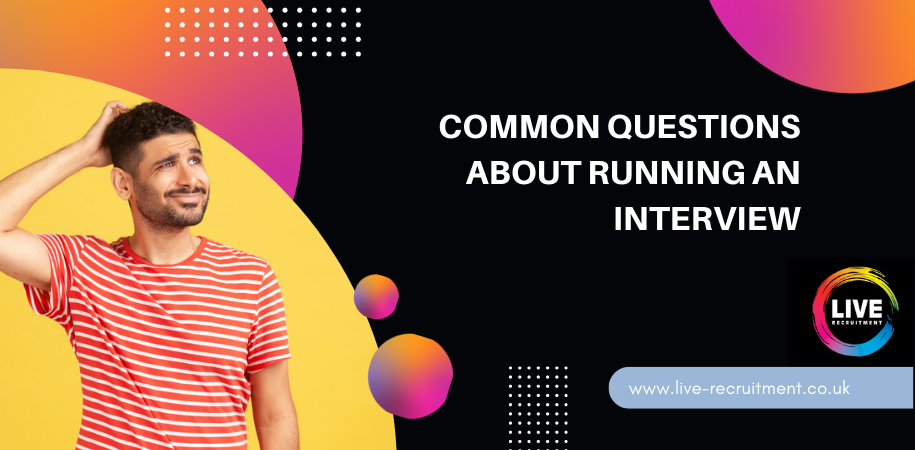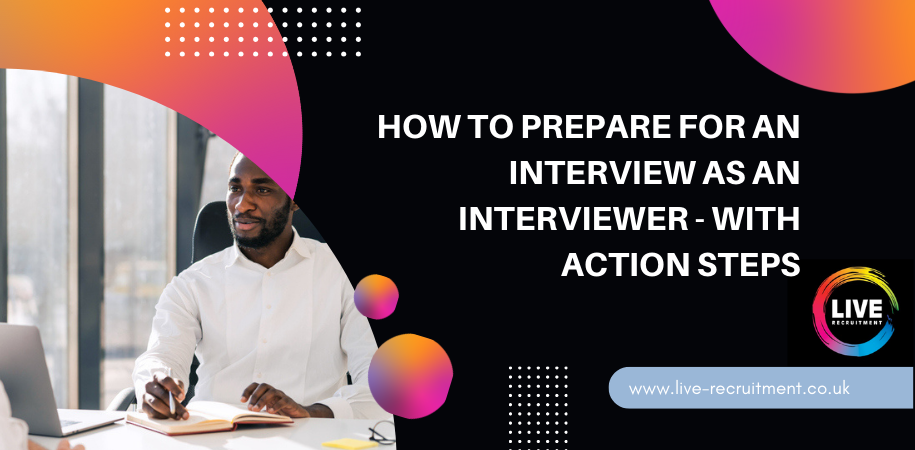Interviewing candidates for a role is a very specific skill. It doesn’t come naturally to everyone, and some people need to spend a lot of time practising to get it right.
As an interviewer, it is important to remember that you are not only assessing the qualifications of the person sitting across from you but also making a first impression on behalf of your company. Whether you are conducting a phone screen or an in-person interview, being prepared will help you put your best foot forward.
Many articles focus on how daunting it can be to be interviewed, but very few pay attention to what it’s like for the person on the other side of the table. Not everyone feels confident in this kind of scenario, so it can be a nerve-wracking experience for everyone involved.
The good news is that there are action steps you can take to prepare. Proper preparation can help you feel more relaxed and at ease in an interview setting. It will also help you to put your anxiety to one side so that you can focus on listening to the candidates and assessing their suitability for the role.
Here are the action steps you need to take when preparing to interview candidates for the first time.
Selecting the candidates
The first step in preparing for an interview is to select the candidates. Review CVs and cover letters to identify qualified candidates. Consider using an applicant tracking system (ATS) to help organise and streamline the candidate selection process.
Split candidates into “yes”, “maybe”, and “no” piles. If you don’t have enough candidates in the yes pile, you can start to think about moving some over from the maybe pile. It’s a good idea to interview a few candidates who might seem less qualified on paper because there is always the chance that they are underselling their skills.
It’s also worth noting that hiring someone with a little less experience can pay off in the long term, particularly if they are keen to learn. They will approach your systems and processes with a blank slate approach, rather than having to adapt their existing experience to the role.
Invite candidates to interview
Once you have a list of qualified candidates, it is time to start scheduling interviews. Begin by sending each candidate an email or calendar invite with the interview details, including the date, time, location, and who will be conducting the interview.
It’s also helpful to let them know the dress code for the company, as this can be a huge source of stress for the candidates. And finally, let candidates know if there will be a task to complete or if they can take notes into the interview with them.
If you conduct a phone screen, provide the candidate with your contact information and let them know how long the call will last.
After you have arranged the interviews, it’s time to start thinking about what you will ask them. Some companies are taking a new approach to interviews whereby they send the candidate the questions ahead of the interview.
This is particularly helpful if you are interviewing young candidates or recent graduates. If you want to get the best out of younger or less experienced candidates, giving them the tools they need to prepare can be incredibly helpful.
However, if you’d like to get a feel for how these candidates think on their feet and respond to stressful situations, then keep the questions to yourself until the interview.
Review the candidate’s application materials
This will give you a good idea of their qualifications and experience. Make a list of things that are missing from their CV and things you would like to know about their experience. Think about any hesitations you have about them and how you can ask questions that will confirm or remove any doubts.
For example, if a candidate has not mentioned leadership experience on their CV, you might ask them, “can you tell me about a time when you took on a leadership role.” They might not have mentioned it because it took place outside of work, but they still have relevant and valuable experience.
Prepare a list of questions in advance
This will help you to keep the interview focused and on track. It will also help to bring structure to the interview and ensure that you ask the candidates the same questions. If you freestyle every interview, it will be difficult to compare candidates like-for-like.
So when preparing questions, create your core questions that will assess their suitability for the role, and then decide what questions will help you to learn more about each candidate. Print out your questions and leave space to write notes for each candidate.
Preparing questions
After you have selected the candidates and scheduled the interviews, it is time to prepare questions. Questions can come in many different formats, but they typically follow the same structure. The most popular types of questions are:
Credential verification questions – this confirms that a candidate has the qualifications you are looking for. This would be more relevant for technical roles.
Experience verification questions – this confirms that their experience really matches what is on their CV.
Opinion questions – this will give you insight into their thoughts on the industry or sector. It can also help you to assess their commercial awareness and their passion for the sector.
Situational questions – this type of question will help you to understand how the candidate has responded to situations in the past. These questions typically start with “can you tell me about a time when….”
Problem-solving questions – this type of question will help you to see how they solve problems on the spot. They don’t have to get the right answer, but it will give you insight into how they solve problems.
Practice your questions
Once you have a list of questions, ask a colleague if you can practice asking them. This is an important step as it will allow you to spot any potential problems with your questions. If they are difficult to understand, or if you need to phrase them in a different way, you’ll learn this before the interview rather than during it.
This will help you to hone your questioning skills and make sure your questions are clear and concise. If a candidate asks you to rephrase a question, you need to make sure that you are able to do so quickly, so it might be worth writing the question out in a few different ways to make sure you are clear on what you are asking.
Prepare for common interview questions
Remember that an interview should always function as a conversation, not an interrogation. At the end of the interview, you should give candidates the opportunity to ask questions. This means you’ll need to be prepared for the tables to turn.
As an interviewer, you should also be prepared to answer common questions from candidates. This shows that you are professional and have taken the time to prepare for the interview.
Some of the most common questions that candidates will ask are:
What is the company culture like?
What do you like the most about this role?
Can you describe a typical day in the role?
What does success look like in this role?
Who would I be working with?
Be prepared to think on your feet and answer questions thoroughly and honestly. Trying to gloss over harsh realities about the company could be considered poor form, as the candidate is also trying to decide if this is the right career move for them. And if you don’t know the answer to a question, don’t try to lie your way through it; simply tell them that you will find out and get back to them.
During the interview
Candidates are often told to be on time, watch their body language and remain professional throughout an interview, and this advice applies to the interviewer too.
Just as you would expect candidates to be on time, you should also make an effort to be punctual. If you can avoid it, don’t keep candidates waiting in the reception area, as this will only add to their nerves.
If you’re running behind schedule, let the candidates know as soon as possible. You should give them the option to reschedule as they may have other commitments. The candidate may be completing the job interview during their lunch break, or they may have other interviews lined up.
Find a quiet place
Make sure you have a quiet and comfortable place to conduct the interview. This will help you to focus and be more professional. Interruptions will throw both of you off your game, so don’t risk conducting the interview in a crowded or public place.
It will also allow the candidate to talk freely, as some people feel self-conscious talking about themselves when they are in a crowded place.
Be sure to dress appropriately for the occasion
First impressions are important, and you want to be professional and competent. You are representing the company and giving the candidate a first impression of who they might be working for. Your attire will also make the candidate feel more comfortable. You should be dressed on the smarter end of your company dress code.
Take some time to relax and clear your head before the interview
This will help you to be calmer and collected during the meeting. If you’re feeling frazzled, it will come across in your questions and tone of voice. Remember that you’ve prepared for the interview, and this should help to calm your nerves.
Even if you have a full schedule, you need to take some time to focus before you switch tasks. If you have to rush into the interview, you might find it takes some time to feel comfortable and at ease, which means you could fail to be truly engaged with the interview process.
Be aware of your body language
Your body language communicates a lot about how you’re feeling, so it’s important to be aware of it during an interview. Try to maintain open body language and make eye contact with the candidate at frequent intervals. This will help to put them at ease. Don’t forget to smile too, as this will make you appear more approachable and personable. At the same time, avoid being too eager as this could also make the candidate uncomfortable.
Be engaged
Throughout the interview, it is important to be engaged. This means making eye contact, being an active listener and not letting your mind wander. It can be easy to tune out when someone is talking for a long time, but you need to focus on what they are saying as this could be important.
Take notes during the interview
If you are interviewing multiple candidates, you can’t be expected to keep all of the details of their answers in your mind. Print out their CV and your list of questions, and then write notes alongside. This can help to put the candidate at ease, as you’ll be able to cast your eyes down to your notes rather than staring at them while they answer.
Ask follow-up questions
If there’s something you’re not clear on or if you want to know more about a certain aspect of their experience, don’t be afraid to deviate from the set questions and ask follow-up questions. This can help you clear up any misconceptions you might have about their experience or education. It also makes the interview more interactive and less formulaic. Don’t be afraid to ask a candidate to elaborate on a particular aspect of their experience you find interesting.
Listen carefully
Candidates say a lot during an interview, but you also need to pay close attention to what they don’t say. What does this mean exactly? Do they speak favourably of their previous employer? Are they open about why they are leaving? There are some things that candidates might try to gloss over, so you need to be prepared to read between the lines and listen to what they are really telling you.
Let them know the next steps
No one likes to be left in the dark, so let candidates know the next steps before they leave. If you plan to hold second interviews, you need to move quickly, as the best candidates won’t stick around.
And if you’re planning to decide, let the candidates know when they can expect to hear either way. At this stage, you might also give feedback to the recruiter if you have worked with one. Try to offer constructive criticism or feedback, which will help candidates improve for future applications and interviews.
After the interview
You should remain professional with the candidates even after the interview concludes. You might switch to small talk, but don’t allow things to become any less professional, as this is still helping to shape their impression of the company.
Some candidates may have follow-up questions after the interview, so be prepared to answer those promptly via email.
Reflect on the candidates
You might have a gut instinct about one candidate over the others, or you might be torn between multiple candidates. Immediately after the interview, write down your initial thoughts, so you don’t forget them. When you meet with lots of candidates, it can be difficult to remember which one is which.
This is an excellent time to bring in a second pair of eyes if you haven’t already. Let this person read through the CVs and then ask for their first impressions. You can then fill in the additional details you’ve learned from the interview and determine if this person reaches the same conclusion.
If you are torn between two candidates, you may need to arrange a second round of interviews. Move quickly if you decide to do this, as good candidates may get snapped up by other companies. If this happens, you may need to start the entire interview process again.
Make a job offer
Remember that the interview process isn’t over until you have offered the role to a candidate, they have accepted, and you’ve successfully negotiated the salary. Until this point, you should assume that you’re still on the lookout for candidates. You should also avoid letting candidates down until you have filled the role, as you may need to offer it to your second choice candidate.
At every point in the interview process, it’s important to be respectful of the candidate’s time. Leaving candidates waiting for an answer or failing to let them know the outcome of the interview could reflect poorly on your company. Remember that candidates talk, and being rude or disrespectful in the interview process could make other candidates reluctant to interview with you in the future. This can make roles incredibly difficult to fill.
By following these tips, you can ensure that you are prepared for an interview as an interviewer. This will help you to make a better impression on the candidate and increase your chances of finding the right person for the job.
Common questions about running an interview

What should I do if I’m nervous about the interview?
If you aren’t a natural communicator, leading an interview can be nerve-wracking. Being prepared is the best thing you can do to calm your nerves. Practice will also help to make things easier. And try to remember that it’s really just a conversation between two people. You should also remember that the candidate may be a lot more nervous than you.
What should I avoid when interviewing?
Try to avoid doing anything that would be distracting to the person on the other side of the table. Be aware of your body language and what you are doing. Some people tap their pen, bite their nails or play with their hair when they are uneasy. This could be very distracting for the candidate and could lead them to give a poor interview performance.
Do all interviews need to be the same?
While there might be a few small differences in the interview questions, you should attempt to standardise the interview to make things easier for yourself. It’s much easier to compare candidates when you have asked them all the same questions. However, there may be occasions when the interview naturally leads in a different direction. In this case, you don’t have to ask identical questions.
Is it ever acceptable to end an interview early?
In some cases, you learn pretty quickly that a candidate doesn’t have the level of experience you are looking for. Or you might discover an obvious red flag that would make them unsuitable for the role. This could be because the candidate has stretched the truth on their CV, blatantly lied, or you have misread the information. Whatever the reason, it’s best not to waste anyone’s time. Try not to end the interview abruptly and instead find a way to bring it to a natural conclusion. Offering personalised feedback after the interview will help this candidate move on to a more suitable opportunity.
What happens if an interview runs over?
Time management is crucial when running an interview panel, particularly if you have back-to-back interviews. But sometimes, when you meet the right candidate, you might find that an interview runs over the allotted time.
The first step when you suspect that an interview will run over is to check with the candidate if they can stick around. If they have a prior engagement, they might want to wrap things up. You should also check your own schedule to make sure you won’t be keeping another candidate waiting.
When an interview runs over, this typically means that you’ve found someone who is a good match. Letting the interview run over can avoid the need to invite them back to a second interview by allowing you to check all of the boxes in your first meeting. You might even introduce the candidate to the wider team.


